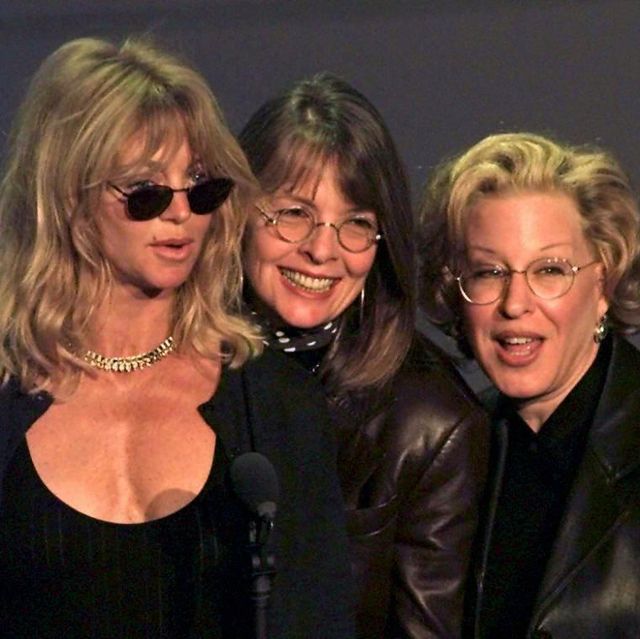The chapel was silent — the kind of silence that only falls when hearts are breaking.
Inside, beneath soft golden light and walls lined with white roses, some of Hollywood’s most beloved faces sat shoulder to shoulder. Meryl Streep. Goldie Hawn. Steve Martin. Al Pacino. All gathered for one woman — Diane Keaton, the eccentric, radiant soul who made the world laugh, cry, and fall in love with imperfection.:max_bytes(150000):strip_icc()/Bette-Midler-diane-keaton-101125-5dff1aa05f36475096f44a828a33dd15.jpg)
But it was Bette Midler — Diane’s dearest friend of over forty years — who stood trembling before the casket, clutching a single photograph in her hand. It was from The First Wives Club — three women in white, smiling in mid-rebellion, defying age, heartbreak, and Hollywood itself.
And now, only one of them stood to speak.
“Diane,” Bette began softly, her voice barely above a whisper, “you were the brightest light in every room.”
The words trembled, but they didn’t break — not yet. She took a deep breath, eyes glistening as she looked around the chapel filled with the people Diane had inspired: filmmakers, co-stars, and the lifelong friends who had built their careers alongside her.
“She never tried to be like anyone else,” Bette continued, a faint smile tugging at her lips. “In an industry obsessed with perfection, Diane made imperfection a kind of art. The hats, the gloves, the wide-eyed laugh that ruined half our takes — she was gloriously, unashamedly herself.”
Laughter rippled softly through the mourners, followed by a hush that carried the weight of shared memories.
Bette spoke not as a celebrity, but as a friend — remembering late-night calls, unfiltered honesty, and Diane’s strange habit of photographing every dinner table before anyone ate.
“She told me once,” Bette said, “‘Bette, I take pictures of the food because one day, when we’re gone, people should know what joy looked like.’” She paused, the words landing like a whisper from beyond. “That was Diane — always capturing joy, even in the simplest things.”
Behind her, a screen flickered to life, displaying moments that defined Diane’s extraordinary life: Annie Hall walking through Central Park, Something’s Gotta Give’s quiet smiles, Reds’ intensity, The First Wives Club’s laughter. Each frame was a reminder of how deeply she had touched the world — and how much brighter it had been with her in it.
Then, as the final photo faded — Diane laughing, head thrown back, hat tilted just so — Bette took a step closer to the casket.
“I wasn’t sure I could do this,” she confessed, her voice cracking. “But Diane once told me, ‘If you ever sing at my funeral, don’t do it for me. Do it because the world still needs music.’”
And with that, Bette closed her eyes and began to sing.
There was no orchestra. No stage lights. No rehearsal. Just her voice — trembling, raw, and soaked in love.
“Did you ever know that you’re my hero…”
A murmur rippled through the chapel. Some bowed their heads. Others reached for tissues. By the second verse, even the most stoic faces — seasoned legends who had seen and survived everything Hollywood could offer — were quietly weeping.
“She was my hero,” Bette whispered between lines, unable to keep singing for a moment. “She really was.”
And then, somehow, she gathered herself and kept going.
“You’re everything I wish I could be…”
The air seemed to shift. Even the sound of cameras stopped. It was as if the entire room — the entire history of their friendship — had come down to this one moment.
By the time she reached the final line, her voice barely a whisper, tears streamed freely down her cheeks.
“Fly high, my friend…”
Silence followed — deep, reverent, and unbroken. Even the wind outside seemed to pause.
For a few seconds, no one dared to move. Then, slowly, as if on cue, every person in the room stood. Not for the song, not for the performance — but for the woman whose spirit had filled their lives with laughter, courage, and light.
When the ceremony ended, Bette lingered. She placed the photograph from The First Wives Club on the casket — a promise, a memory, a farewell.
“She lived out loud,” Bette murmured to a small circle of friends nearby. “With humor, grace, and heart. She never hid from life — she danced with it.”
Outside the chapel, the evening sky turned soft pink, the same shade Diane often chose for her lipstick. The press waited at a respectful distance, cameras lowered, as the guests filed out quietly.
No one wanted to speak. Words felt too small.
Later that night, Bette Midler posted a single photo to her social media — a candid shot of Diane laughing on set, hair flying, hat slipping to one side.
The caption read:
“You were my wind, my laughter, my reminder to live loudly. Thank you for teaching us that being yourself is the bravest act of all. Fly high, my friend.”
Within hours, the image flooded across the internet. Fans from every generation — from Annie Hall devotees to The First Wives Club nostalgics — shared their own memories, their own stories of how Diane Keaton had made them feel seen.
Because that was her gift.
She didn’t just play characters. She was them — every insecurity, every burst of joy, every human flaw turned into art.
That night, as the lights of Los Angeles glittered beyond the hills, Bette Midler sat by her window with a glass of wine, replaying an old voicemail.
“Bette,” Diane’s voice said, laughter bubbling through, “don’t ever forget to laugh, even when you’re crying. It’s the only thing that saves us.”
And so, she laughed — through tears, through silence, through grief.
Because Diane Keaton had taught her, and the world, that even goodbye could be beautiful.
“She never tried to be anyone else,” Bette had said earlier that day.
“And maybe that’s why we all wanted to be her.”





